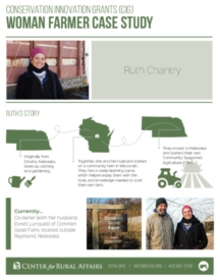Currently, she is the co-owner (with her husband, Evrett Lunquist) of Common Good Farm, located outside Raymond, Nebraska.
Ruth has utilized U.S. Department of Agriculture (USDA) Environmental Quality Incentives Program (EQIP) conservation programs including the high tunnel cost share and a separate organic EQIP program focusing on rotational grazing, cover crop, nutrient, pest management, and EQIP Drought Assistance Funding in 2012 for reseeding pastures. Common Good Farm is certified organic and certified biodynamic, meaning organic agriculture standards are met.
This case study was supported by Conservation Innovation Grant funding from the U.S. Department of Agriculture (USDA) Natural Resources Conservation Service. The Center's work through this grant features beginning, women, and veteran producers who use conservation in their farming operations. Stay tuned for information regarding upcoming webinars for beginning, women, and veteran farmers and ranchers.
Check out our feature blog on Ruth, by clicking here.
This material is based upon work supported by the Natural Resources Conservation Service, USDA, under number 69-3A75-17-46. Any opinions, findings, conclusions, or recommendations expressed in this publication are those of the authors and do not necessarily reflect the views of USDA. USDA is an equal opportunity provider and employer.
Cora Fox, Liz Daehnke, Kylie Kai, Cody Smith, and Rhea Landholm contributed to the production of this case study.


